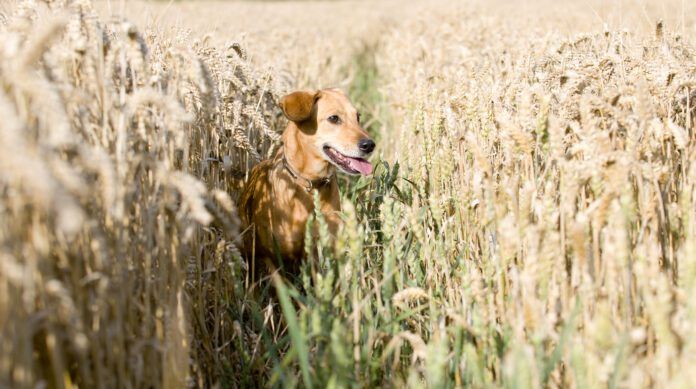Grain-free dog food has become a popular choice among pet owners in recent years, often marketed as a healthier alternative to traditional kibble that contains grains like wheat and corn. However, while grain-free diets may offer certain benefits to some dogs, they may not be the right choice for every pet. This article explores both the pros and cons of grain-free dog food to help you make an informed decision for your pet’s health and well-being.
As the name suggests, grain-free dog food and treats do not contain any grains, such as wheat, corn, barley, rice, or oats. Instead, these diets rely on alternative carbohydrate sources such as potatoes, sweet potatoes, peas, lentils, chickpeas, or tapioca. These ingredients provide energy and nutrients for the diet and eliminate the need for grains in the formula.
Choosing the Right Food for Your Dog
It is important to understand that all commercial diets, regardless of the ingredients used, are formulated to fall within the necessary nutritional requirements from the Association of American Feed Control Officials (AAFCO). These standards ensure overall health and nutritional adequacy, regardless of the inclusion or absence of grain. Always check your food label to be sure the food you choose meets AAFCO standards for your specific dog.
When Grain-Free Dog Food May Be Good
When selecting any pet food, it is essential to consider your dog’s individual needs, including age, breed, activity level, and any health concerns. There are some situations where a grain-free diet may be the best choice for your dog. Some dogs have food sensitivities or allergies to grains, which can result in digestive upset or skin issues.
Common symptoms of food sensitivities in dogs include:
- Bloating
- Vomiting
- Diarrhea
- Itchy skin
- Ear infections
- Hot spots
If your dog is sensitive to grains, a grain-free diet may reduce the risk of triggering these issues and help improve your pet’s health.
Grain-free diets are sometimes used by pet owners who prefer a higher-protein, lower-carbohydrate food for their dog. Dogs with high energy levels or those needing to build or maintain muscle mass may thrive on a protein-dense, grain-free diet.
However, while grain-free diets are often marketed as “high-protein,” not all grain-free foods are created equal. Some foods may rely on non-animal protein sources, such as peas and lentils, instead of using meat. It is also important to note that grain-free does not mean the diet is carbohydrate-free, so keep this in mind when evaluating your options, especially if you are considering switching your pet for weight loss, or to help manage diabetes or insulin resistance.
Concerns About Grain-Free Dog Food
While grain-free dog food can be beneficial for certain dogs, there has been concern in the past several years among veterinarians regarding a potential link between grain-free diets and a heart condition called dilated cardiomyopathy (DCM). DCM affects the heart’s ability to pump blood effectively, which can lead to heart failure or even sudden death.
In 2018, the Food and Drug Administration (FDA) launched an investigation to determine if there was a link between grain-free diets, particularly those rich in legumes (peas, lentils, chickpeas), and an increased incidence of DCM. The concerns arose from reports suggesting that dogs, especially breeds that were genetically predisposed to DCM, were developing the condition at an alarming rate while eating grain-free foods.
Since the FDA’s initial report, studies have been conducted, though a definitive correlation between grain-free diets and DCM has not been established. Many veterinarians agree that DCM is a multifactorial disease, meaning it can be caused by a combination of many factors including genetics, environment, lifestyle, and diet.
Regardless of the diet you are feeding, you should always keep an eye out for signs of DCM, which include:
- Coughing
- Lethargy
- difficulty breathing
- Loss of appetite
- Collapsing
If you notice any of these signs, consult your veterinarian immediately.
Making the Grain-Free Decision
Ultimately, the decision to feed your dog a grain-free diet depends upon a variety of factors, including your dog’s health status, breed, and individual needs. While grain-free dog food may benefit some dogs with food sensitivities or allergies, it may not be necessary for all pets.
Grain-inclusive diets contain grains, which provide a source of easily digestible carbohydrates. These diets can be an excellent choice for dogs without food sensitivities and many dogs thrive on them. On the other hand, if your dog has a grain sensitivity or is prone to food allergies, a grain-free diet may be a better-fit. The key is to understand your dog’s unique dietary needs and consult with your veterinarian to determine the most appropriate food.







Too much grain in this article and not enough meat.
I had been purchasing the highest protein foods for our Callie thinking since she was near 11 yrs she needed all the meat protein I could provide. For her, how wrong I was. She began with diarrhea and losing weight. Many trips to the Vet, and dollars also, she is on a hydrolyzed diet which gives her protein using veggies and some grain but no meat. My mistake was looking at the 31% Minimum Protein instead of seeing Minimum, I was “seeing” Maximum. I wish they would list the Maximum instead of Min. on the ingredient list. Fat is also listed as minimum. So, Anastasia, not all dogs can have a high quantity of meat. (I’m sure your statement was “tongue in cheek”) 😉
I’m trying to learn all I can about what is the best food for my puppy. She is an 8 1/2 month old Bichon Frise. She is currently eating Royal Canaan and she is thriving but recently doesn’t seem too fond of it. Also the #1 ingredient is rice #2 is chicken meal there are a few items recognizable as food then a list a mile long of chemicals.
She has a problem with eye stains so I don’t think chicken is good. Our last Bichon lived to be 18 years old. She died of kidney failure. We fed her Wellness Small Breed her whole life . I really want to give Joy the healthiest food ibut, have no idea what that is .
PLEASE can you help? Thanks, Kathy Boldt